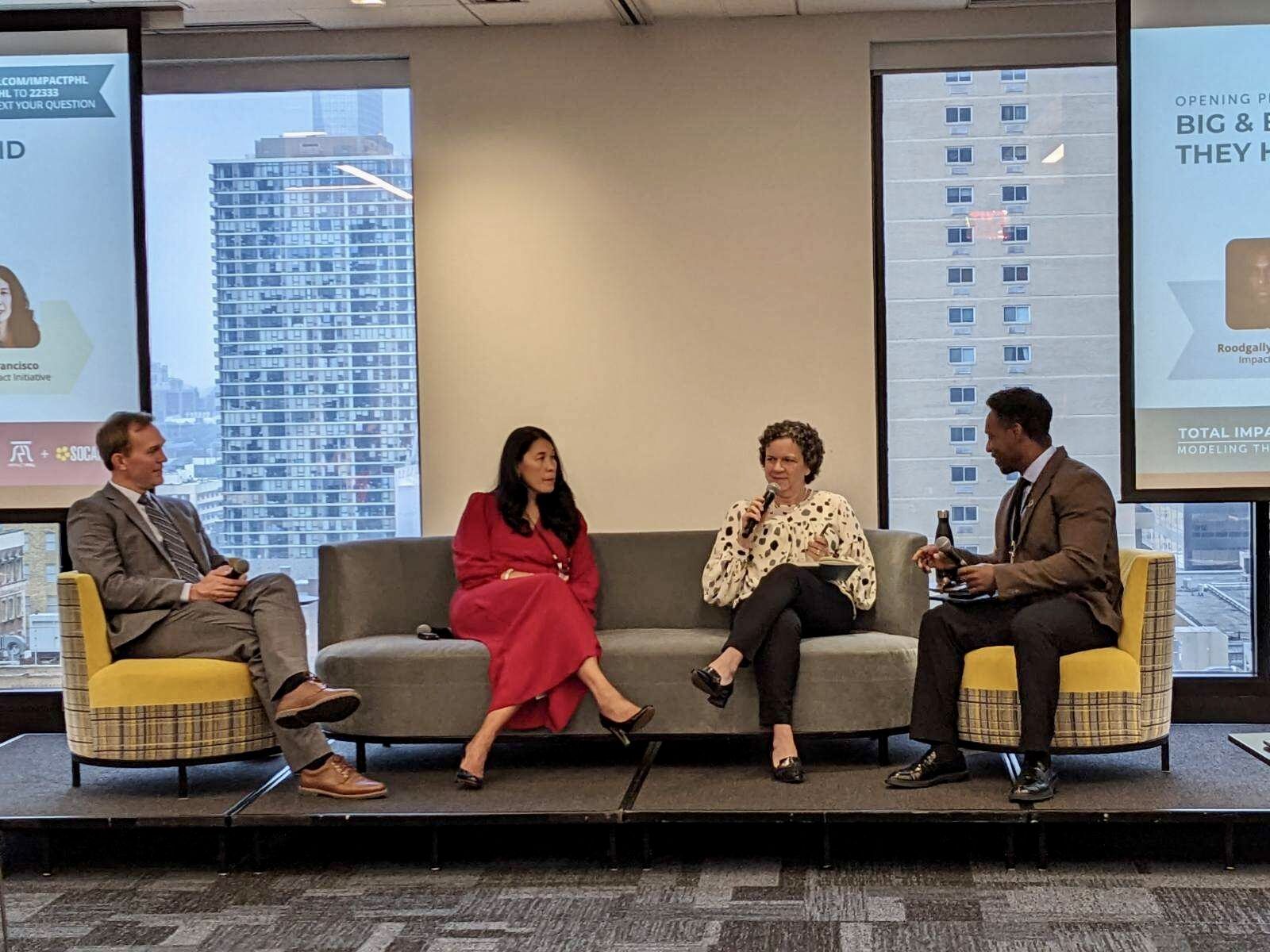Greetings, Agents of Impact!
Featured: ImpactAlpha Original
Beyond Coal: Three tech-driven projects model a more diverse and sustainable Appalachian economy. Evidence of unsustainable value creation and neglect mar Appalachia’s coal country. But the region is determined to cut a path that shows how investing in people, communities and innovation can accelerate an equitable transition to a post-coal economy. In Part Two of ImpactAlpha’s two-part series on Appalachia’s post-coal economy, three projects offer a potential roadmap for other communities looking to diversify away from coal (see, Part One, “Seeding Appalachia’s sustainable future with public and private capital”). The tech-driven projects also begin to showcase investable opportunities in the region’s sustainable future. “[The legacy of coal mining] indirectly impacts everything in the state,” Fritz Boettner of Sprouting Farms, a West Virginia nonprofit that supports sustainable farm businesses, told ImpactAlpha. Boettner is project lead on a new solar-powered aquaponics facility in Kermit, West Virginia. “The economic ecosystem of mines is so much more than the mine.”
Engineers are teaming up with artists and advocates to turn a contaminant found in coal mine-polluted water into a high-quality paint pigment. “The amount of paint that we will be able to produce each year far exceeds the needs of the art market,” Michelle Shively of Rural Action in Appalachian Ohio told ImpactAlpha. Shively says the end-product can also be used for colored concrete, barn paint, coatings and bricks. A third project underway is a solar-powered data center in Wise County, Virginia. The twin aims: Remediate a barren mine site and lure corporations with renewable energy goals – and large data needs – to the region as employers. “More and more, we’re hearing from companies across the private sector who understand that solar can help them communicate their values, meet their energy needs, and have a positive impact on their bottom line,” says Devin Welch of Charlottesville, VA-based Sun Tribe Solar, one of the project partners.
Keep reading, “Three tech-driven projects model a more diverse and sustainable Appalachian economy,” by Jean Haggerty on ImpactAlpha.
Dealflow: Follow the Money
Remitly raises $220 million for low-cost money transfer services. Seattle-based Remitly was an early mover in disrupting the fragmented and fee-laden international money transfer market. The company’s mission is to make it easier and cheaper for immigrants to send money home. It has set up 700 money transfer “corridors” worldwide, allowing people to send money online or by mobile phone at no cost or lower cost to other services. Its latest debt and equity funding round brought in $220 million—and with it a valuation of close to $1 billion. Al Gore’s investment company Generation Investment Management led the round. Until now, Remitly hasn’t attracted much impact investment. But Remitly’s Matt Oppenheimer is outspoken about the company’s impact mission and focus on “remittance flows from developed countries to emerging nations.” Oppenheimer hinted that the company may soon launch a new credit service. “The idea is to transform the lives of immigrants and their families,” he said. “It can have a painful impact not having a credit history.” Read on.
Harvest Returns’ Opportunity Fund will focus exclusively on sustainable agriculture. Fort Worth-based Harvest Returns is seizing on the Opportunity Zones tax benefit passed in the 2017 tax legislation to spur sustainable agriculture investment. The online marketplace for agriculture investing launched an Opportunity Fund to invest in agriculture projects in rural areas inside federally designated Opportunity Zones. Harvest Returns is not the first investment marketplace to launch an Opportunity Zone fund. Commercial real estate investing platform Fundrise launched one in August last year. “Our Opportunity Zone Fund is unique in that it is one of the very few funds not focused on urban commercial real estate,” Harvest Returns’ Chris Rawley said. The platform is partnering with agtech fund manager FutureFoodCo and has reportedly surveyed $245 million in potential investments. The fund is open to accredited investors with a minimum investment of $25,000. More.
Brooklyn’s Incubator Project backs local nonprofits driving racial justice. Brooklyn is a diverse borough, made up of people of color, immigrants and other minority groups. Since 2015, the Brooklyn Community Foundation has supported the growth of local, upstart nonprofits driving racial justice through its Incubator Project. The incubator has now outgrown the foundation. To house this year’s cohort of six organizations, the foundation teamed with coworking center Brooklyn Creative League. Among the cohort: Documented, a nonprofit news website committed to educating immigrants on immigration policies; BlackSpace, a community of local African-American professionals building and preserving Black communities; and the Women’s Organizing Network, which advances the leadership of women organizers, particularly women of color. “We believe in community residents,” the foundation’s Amy Chou told ImpactAlpha. “We’re relying on our community leaders to tell us what they need.” Each organization receives seed funding and 18 months of free access to Brooklyn Creative League’s space. Check it out.
Signals: Ahead of the Curve
Perceptions of profitability drive “fundamental shift” in small-farmer finance market. Just a few years ago commercial banks and even microfinance institutions mostly served large-scale farmers in commercialized valued chains. Smallholder farmers, and the small agribusinesses that serve them, faced at least a $150 billion annual financing gap. “We have witnessed a fundamental shift in the market,” say the Rural and Agricultural Finance Learning Lab and ISF Advisors, a Dalberg spinoff. In a preview of an update to their landmark “Inflection Point” report, the rural finance experts say perceptions around the profitability of lending to small farmers in emerging markets is changing. “Rather than being a beneficiary, the smallholder farmer is increasingly viewed as a potentially valuable customer,” they say. That change has triggered “a significant influx of private sector, for-profit (financial) providers—both innovators and incumbents—who are innovating and expanding the market frontiers.” Behind the shift:
- Catalytic capital. Foundations including the Mastercard Foundation and the Bill and Melinda Gates Foundation, development agencies like USAID and niche impact investors, such as Acumen and Accion, have seeded the market with more than $250 million in patient capital to help smallholders prove business models and product-market fit. A flood of new financial service providers now serve smallholder households and agribusinesses with new services, tools and products.
- Impact tech. The spread of digital technology is enabling new products, such as micro-insurance and asset-financing options. It’s also transforming how financial service providers do everything from credit scoring to delivering products and training (see, for example, “Agtech startups connect Indian farmers to customers”).
- Agribusiness ecosystem. A stronger ecosystem of incubators, accelerators, technical assistance providers, investors and impact and impact funds is emerging to address the distinct finance and business development needs of ag-based small businesses (see, “Omnivore raises $46 million in second fund for Indian agriculture”). Other examples include African Management Initiative, Enablis, Technoserve Entrepreneurship and Stawi Africa.
- You heard it on ImpactAlpha: “Smallholder farmers are investable.”
- Share this post.
Agents of Impact: Follow the Talent
Danielle Burns, ex- of First Affirmative Financial Network, joins CNote as head of business development… Schan Duff joins Kiva as vice president of strategy and protocol… ICA Fund Good Jobs is looking for a managing director of investments in Oakland… Impact Capital is hiring an associate program officer of lending in Seattle… Impact Entrepreneur is hosting “Impact Investment & Global Development,” a July 18 webinar featuring Gillian Marcelle of Resilience Capital, African Development Bank’s Solomon Asamoah, Robert Kraybill of Impact Investment Exchange, Giselle Leung of the Global Impact Investing Network and Stephen Nolan of the U.N. Environment Financial Centers for Sustainability Network (see, “Why business accelerators are good investments for global development”).
— July 15, 2019.











